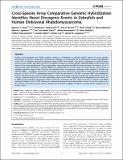Cross-Species Array Comparative Genomic Hybridization Identifies Novel Oncogenic Events in Zebrafish and Human Embryonal Rhabdomyosarcoma

View/
Author
Dobrinski, Kimberly P.
Clagg, Ryan
Edelman, Elena
Chen, Jin Yun Helen
Brockmann, Jillian
Nielsen, G. Petur
Keller, Charles
Note: Order does not necessarily reflect citation order of authors.
Published Version
https://doi.org/10.1371/journal.pgen.1003727Metadata
Show full item recordCitation
Chen, E. Y., K. P. Dobrinski, K. H. Brown, R. Clagg, E. Edelman, M. S. Ignatius, J. Y. H. Chen, et al. 2013. “Cross-Species Array Comparative Genomic Hybridization Identifies Novel Oncogenic Events in Zebrafish and Human Embryonal Rhabdomyosarcoma.” PLoS Genetics 9 (8): e1003727. doi:10.1371/journal.pgen.1003727. http://dx.doi.org/10.1371/journal.pgen.1003727.Abstract
Human cancer genomes are highly complex, making it challenging to identify specific drivers of cancer growth, progression, and tumor maintenance. To bypass this obstacle, we have applied array comparative genomic hybridization (array CGH) to zebrafish embryonal rhabdomyosaroma (ERMS) and utilized cross-species comparison to rapidly identify genomic copy number aberrations and novel candidate oncogenes in human disease. Zebrafish ERMS contain small, focal regions of low-copy amplification. These same regions were commonly amplified in human disease. For example, 16 of 19 chromosomal gains identified in zebrafish ERMS also exhibited focal, low-copy gains in human disease. Genes found in amplified genomic regions were assessed for functional roles in promoting continued tumor growth in human and zebrafish ERMS – identifying critical genes associated with tumor maintenance. Knockdown studies identified important roles for Cyclin D2 (CCND2), Homeobox Protein C6 (HOXC6) and PlexinA1 (PLXNA1) in human ERMS cell proliferation. PLXNA1 knockdown also enhanced differentiation, reduced migration, and altered anchorage-independent growth. By contrast, chemical inhibition of vascular endothelial growth factor (VEGF) signaling reduced angiogenesis and tumor size in ERMS-bearing zebrafish. Importantly, VEGFA expression correlated with poor clinical outcome in patients with ERMS, implicating inhibitors of the VEGF pathway as a promising therapy for improving patient survival. Our results demonstrate the utility of array CGH and cross-species comparisons to identify candidate oncogenes essential for the pathogenesis of human cancer.Other Sources
http://www.ncbi.nlm.nih.gov/pmc/articles/PMC3757044/pdf/Terms of Use
This article is made available under the terms and conditions applicable to Other Posted Material, as set forth at http://nrs.harvard.edu/urn-3:HUL.InstRepos:dash.current.terms-of-use#LAACitable link to this page
http://nrs.harvard.edu/urn-3:HUL.InstRepos:11877115
Collections
- HMS Scholarly Articles [17922]
Contact administrator regarding this item (to report mistakes or request changes)


